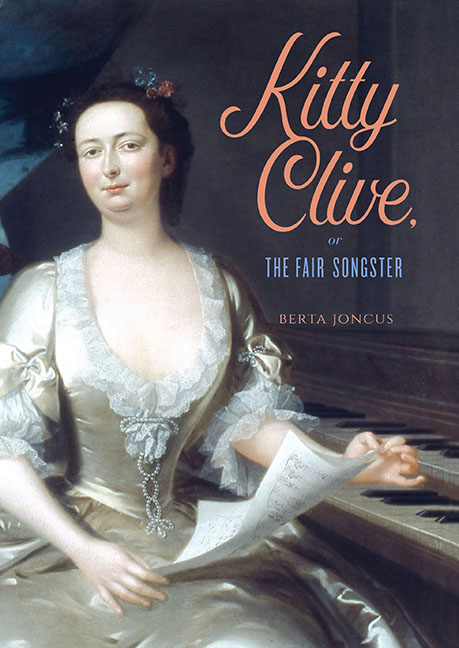Book contents
- Frontmatter
- Dedication
- Contents
- Illustrations
- Preface
- Conventions of Transcription
- 1 The Siren Song: Kitty Clive in the Playhouse
- 2 ‘The Lovely Virgin tun'd her Voice’: Henry Carey and the Production of a Native Songster
- 3 ‘Charm'd with the sprightly Innocence of Nell’: The Metamorphosis of Miss Raftor
- 4 ‘HINT writes, and RAFTOR acts in Drury-lane’: Clive, Fielding, and Theophilus Cibber
- 5 ‘The pious Daughter, and the faithful Wife’: Fielding, Miller, and Clive, 1733–35
- 6 ‘A Likeness where none was to be found’: Contested Images of Clive, 1734–37
- 7 The Patriot Soprano: British Worthies at Drury Lane
- 8 Handel and the Sweet Bird of Drury Lane, 1740–43
- 9 The Case of Mrs. Clive
- 10 Of Scuffles and Rivalries: The Demise of ‘Kitty Cuckoe’
- 11 From Miss Lucy to Mrs. Riot: Voice and Caricature
- 12 Clive on Clive: The Rehearsal: Or, Bays in Petticoats
- 13 Conclusion: The Fair Songster
- Appendix 1 Catherine Clive's Roles 1728–69
- Appendix 2 Lines in Catherine Clive's Repertory 1728–69
- Appendix 3 The Case of Mrs. CLIVE (1744)
- Select Bibliography
- Index
7 - The Patriot Soprano: British Worthies at Drury Lane
Published online by Cambridge University Press: 20 September 2019
- Frontmatter
- Dedication
- Contents
- Illustrations
- Preface
- Conventions of Transcription
- 1 The Siren Song: Kitty Clive in the Playhouse
- 2 ‘The Lovely Virgin tun'd her Voice’: Henry Carey and the Production of a Native Songster
- 3 ‘Charm'd with the sprightly Innocence of Nell’: The Metamorphosis of Miss Raftor
- 4 ‘HINT writes, and RAFTOR acts in Drury-lane’: Clive, Fielding, and Theophilus Cibber
- 5 ‘The pious Daughter, and the faithful Wife’: Fielding, Miller, and Clive, 1733–35
- 6 ‘A Likeness where none was to be found’: Contested Images of Clive, 1734–37
- 7 The Patriot Soprano: British Worthies at Drury Lane
- 8 Handel and the Sweet Bird of Drury Lane, 1740–43
- 9 The Case of Mrs. Clive
- 10 Of Scuffles and Rivalries: The Demise of ‘Kitty Cuckoe’
- 11 From Miss Lucy to Mrs. Riot: Voice and Caricature
- 12 Clive on Clive: The Rehearsal: Or, Bays in Petticoats
- 13 Conclusion: The Fair Songster
- Appendix 1 Catherine Clive's Roles 1728–69
- Appendix 2 Lines in Catherine Clive's Repertory 1728–69
- Appendix 3 The Case of Mrs. CLIVE (1744)
- Select Bibliography
- Index
Summary
Miller accommodates the Shakespeare Ladies’ Club – the Licensing Act and Clive's short-term profit – John Beard joins voice with Clive – Frederick, Prince of Wales takes the public stage – Clive becomes Euphrosyne – Pistol vanquished by the Patriot Soprano
With the Polly Row behind her, Clive began a five-year reign as Drury Lane's first actress as well as its first singer. Otherwise unrelated circumstances came together to consolidate her position. Once Drury Lane hired Handel's young principal tenor John Beard in 1737, the house gained a vocalist whose musicianship matched hers, and he became her constant singing partner. Drury Lane continued to mount James Miller's vehicles for Clive, despite cabals organized against him. The Shakespeare Ladies’ Club campaigned for Shakespeare productions, and parts with song were fitted to Clive. Not only did Theophilus Cibber's managerial powers continue to wither, but in 1738, scandal engulfed him and Susannah Cibber, and this couple, who in their separate ways had challenged Clive's progress, quit Drury Lane.
It was extra-theatrical politics that gave Clive her biggest career boost. Opposition to King George II and his first minister Robert Walpole, simmering for years, was newly inflamed in 1737 by Walpole's refusal to declare war against Spain in defence of British trade routes. Two Opposition flashpoints affected Clive directly. The first was Walpole's passing of the Licensing Act in June, which shut down all theatre companies without a royal patent and imposed censorship on any work to be mounted. The second was King George II's ejection from court in September of his son, the now-popular Frederick, Prince of Wales, who thereafter became a figurehead for the Opposition, which included a faction known as the ‘Patriot Boys’.
The suppression of fringe theatres after the Licensing Act benefited Clive at first, by cutting down competition. As resentment towards Walpole's governance mounted, James Miller began to support the Opposition, writing Clive vehicles that doubled as the kind of dissent formerly expressed at fringe theatres. His first stage work in this vein was his adaptation of Much Ado about Nothing (1737).
- Type
- Chapter
- Information
- Kitty Clive, or the Fair Songster , pp. 194 - 226Publisher: Boydell & BrewerPrint publication year: 2019

